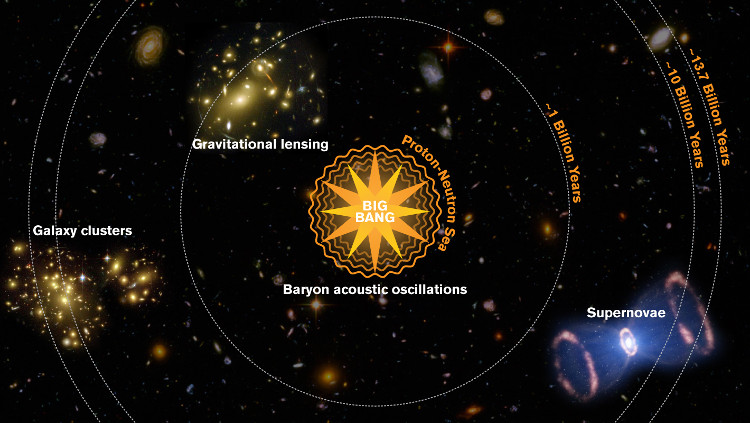Many scientists object to the new theory of denying dark matter and dark energy
Recently, many foreign newspapers and news sites have published a new study proving dark matter and dark energy (two components that account for more than 95% of the cosmic structure) do not exist.
has encountered many strong objections from some scientists. Let me introduce you to an interesting article on this topic on Cosmos Magazine website.
, and new hypotheses
Dark matter was first discovered in 1933, when scientists believed that limiting to visible material could not explain the movement of stars and galaxies. There is a mysterious element in the gravitational forces that dominate their movement. So far we have not observed the mysterious material named this dark matter, but scientists believe that in the current universe, dark matter occupies 5 times more ordinary matter (25% compared to 5%).
Dark energy was discovered later, when celestial physicists realized that there must be some kind of energy that produces repulsive force that causes galaxies to increase the speed of flying away from each other (often referred to is the expanding universe). Dark energy is much more than dark matter, accounting for nearly 70% of the huge energy in the universe.
In the opinion of Swiss astronomer Maeder published in The Astrophysical Journal, it is possible to explain the acceleration and movement of stars without the need for dark matter and dark energy. This means that Einstein's concept of space-time may be wrong because space-time is a concept derived from Einstein's, the foundation for scientists to assume that there is dark matter and dark energy.

The traditional universe model originated from Big Bang 13.8 billion years ago and continuously expanded.(Illustration).
Maeder argues that in the traditional universe model originating 13.8 billion years ago and continuously expanding, there is an element that has not been considered. That element is invariant according to the size of the empty space, meaning that the space is empty and its properties do not change by scale (whether it is expanded or narrowed).
This factor will affect our entire understanding of gravitational attraction and evolution.
Based on the invariant empty space hypothesis and other suitable parameters, Maeder demonstrated that the expanding universe does not need dark energy, and that stars and galaxies can also move without objects. dark matter.
Opinions of scientists
Maeder's work has been opposed by many scientists.
A blogger who is a physicist at the Frankfurt Institute for Advanced Studies in Germany wrote that Maeder "understood his work" but did not give "a consistent theory".
According to Katie Mack, an astrophysicist from the University of Melbourne (Australia), this study is "overwhelmingly sensational".
Katie notes that the strongest evidence of dark matter is not the movement of stars and galaxies but the behavior of matter according to the scale of the universe . These behaviors are measured by signals from cosmic background radiation and the distribution of galaxies. A phenomenon often used by astronomers to observe distant astronomical objects is gravitational lensing (observing celestial objects farther away from images of nearby galaxies), also showing existence. of dark matter.

According to celestial physicist Katie Mack from Australia, the gravitational lens is also a proof of dark matter.
For Katie, there are numerous ways to adjust Einstein's and Maeder's research " nothing new and particularly interesting". The challenge here is to rediscover everything, including "the greatest successes of dark energy and dark matter". There is no reason to throw away the current theory until a new unified theory is found with the results of many cosmological measurements to date.
A dark matter researcher from Reno University in Nevada (USA), Benjamin Roberts also agrees with Katie.
According to Benjamin, the evidence for dark matter is very basic and comes from many sources. There is no reason to doubt the existence of dark matter without a rational explanation for all observations.
- New explanation of the origin of dark matter
- What is dark energy?
- The race to find dark matter is heating up
- The mystery of dark energy
- Dark energy and dark matter do not exist as scientists think
- Earth is losing dark matter
- The physics king Hawking talks about dark matter
- Publish the world's first dark matter map
- Found signs of dark matter
- The mystery of dark matter has been decoded?
- The first image of the dark matter network, which connects galaxies together
- The mysteries of the universe make science
 Van Allen's belt and evidence that the Apollo 11 mission to the Moon was myth
Van Allen's belt and evidence that the Apollo 11 mission to the Moon was myth The levels of civilization in the universe (Kardashev scale)
The levels of civilization in the universe (Kardashev scale) Today Mars, the sun and the Earth are aligned
Today Mars, the sun and the Earth are aligned The Amazon owner announced a secret plan to build a space base for thousands of people
The Amazon owner announced a secret plan to build a space base for thousands of people